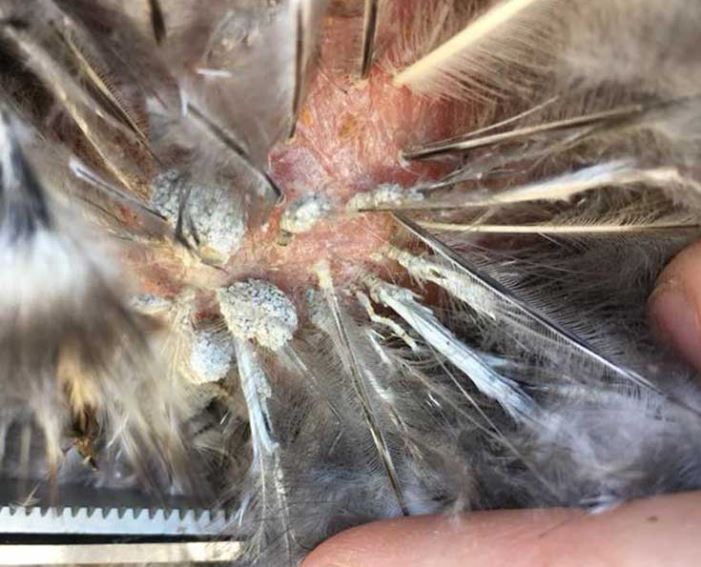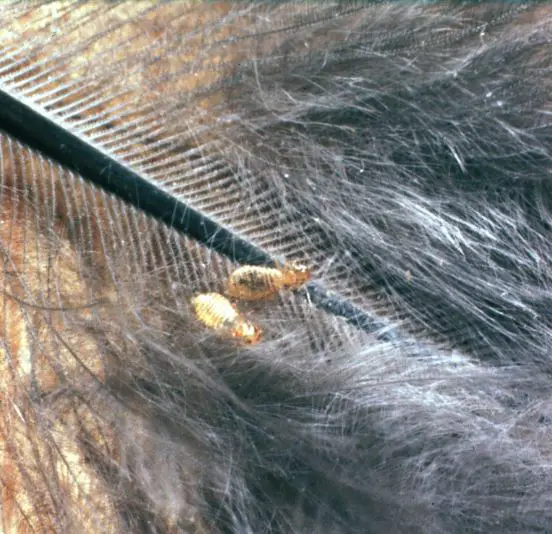It might seem strange to find out that lice can even live on chickens. Chicken lice are not the usual bugs that chickens like to eat.
They can spread quickly and cause a lot of trouble for the whole flock. To keep the flock from getting sicker or even dying, it is very important to find and treat an infestation as soon as possible.
I want to say that you shouldn’t freak out if you find lice in your flock. This has been a fight for many years, and there are ways to find chicken lice on your chickens, treat them, and keep them from getting them in the first place.
You may also want to read about the best chicken coop.
What are Chicken Lice? – Let’s Find Out
Chicken lice are considered external parasites. Think of mites or fleas. They feed on the host from the outside.
Some are very small, while others can be seen with the naked eye. Lice that live on chickens eat their dead skin, blood, feather shaft debris, and anything else they find tasty.
Chicken lice have a long abdomen most of the time. A louse will live its whole life on a chicken that doesn’t know it, usually under the feathers and near the vent.
Chicken lice like warm places to live, so these kinds of cracks and crevices are perfect for them.
Chicken lice can easily spread from one chicken to another, so adding new chickens to a flock can be dangerous if they aren’t quarantined and watched for a while first.
Most of the time, chickens can deal with a few mites now and then. Most of the time, taking a dust bath will stop an infestation.
A chicken usually takes pretty good care of itself and knows when it needs a dust bath. However, when they get chicken lice, that’s when things get bad.
Chicken lice multiply quickly, and if an infestation gets out of hand, many lice will feed on a chicken. This can cause the chicken to lose a lot of blood, which could make it sick.
A chicken with anemia has a weak immune system that makes it easy for it to get other infections and diseases. If the problem isn’t treated, it can often kill the person.
Most people’s most pressing question is, “Can I get lice from my chickens?” “Nope!” is the answer.
Luckily, poultry lice are not like the kind of lice that kids often bring home from school. Instead, they are very different.
Lice that live on chickens are very different and don’t want to live with people. They like our feathered friends better because their main food is the skin and feathers of birds.
Why Chicken Lice Happen
Chicken lice are always around chickens because they live in the same places as them. Even wild birds can give them to them.
It’s not hard for a flock to get sick, and when that happens, it can happen fast. If chickens are kept in bad conditions, there is a much higher chance that they will get lice.
For example, a small, dirty chicken coop is a great place for lice to grow and spread to many chickens.
Since chickens like to roost together, it is easy for lice to move from one chicken to another. If one chicken is infected, it’s likely that the rest of the flock needs to be watched and treated as well.
Leaving one or two untreated is usually a big mistake because the cycle hasn’t been broken.
Signs of a Pest Problem
Lice are pretty easy to spot, and if you keep an eye on an infestation, you can stop it before it gets out of hand.
When a flock has one or more of the following problems, it’s a good sign:
Fatigue: Chickens that aren’t as lively as they used to be might have an infestation. If they seem shy and lethargic, they may have someone following them around that they don’t want.
Infestation is shown by reddish-dark pink spots and wings that look like they have been chewed on.
Pale combs and wattles: When a chicken has anemia, its beautiful bright red combs and wattles often turn a pale pink color. This is a pretty good sign that they might have lice.
Dirty vent: Every hen’s bottom gets a little dirty every now and then, but if the vent looks like it has little bits of dirt around it, it might not just be a bad day in the nesting box.
Wings that hang down: When a chicken isn’t feeling well, its wings hang down. On hot days, they do this to let air flow around their bodies, but if they do it every day, it probably means they aren’t doing so well. Time to look more closely.
Itchy—Lice make you feel itchy! If chickens have lice, they will scratch a lot more than they normally do. They may also be taking more dust baths than usual because the dust soothes the itch and kills the lice. They may be trying to fix themselves.
Egg production goes down. There are many reasons why a chicken’s egg production might go down, but sometimes lice are to blame.
Lice that can be seen: Some types of lice are very small, while others can be as big as 1/4′. The easier they are to see with the naked eye, the bigger they are.
Lice Eggs on Shafts: If you look closer at a chicken’s feather shafts, you’ll see small eggs clumped together around the bottom part of the feather, almost like a buildup of white dirt. Lice love to lay their eggs in this place.

Treatment
At the first sign of lice in a flock, they should all be treated right away so that the lice don’t spread to other animals and kill them.
Lice are hard to get rid of, so doing it right the first time makes it a lot easier. Most early infestations can be fixed by taking the following steps:
Move the chickens out of their coop. Lice love to live on chickens, but they also like to hang out near them when they are not eating. The first step in taking control back from the invaders is to get rid of the chickens.
Treat: Sprinkle food-grade diatomaceous earth on each chicken. This is a natural way to get rid of poultry lice and prevent other health problems. It’s pretty cool and a must-have for anyone who owns a chicken. To do this, take a 50-pound bag of play sand from a hardware store and mix it with 12 cups of DE (diatomaceous earth). This is a great place for your chickens to roll in the dirt.
Feed iron because chickens that have been infected have probably lost a lot of red blood cells because of anemia. Iron is a good way to make up for what they’ve lost. The sick flock will love iron-rich treats like pumpkin seeds, peas, and spinach.
Feed them protein—Protein will give a weak flock the energy it needs to start getting better. Even though it may sound strange, scrambled eggs are a great way to get a quick boost of energy. Hey, it works for people, right? Make sure to feed them protein rich feed.
Clean coop: It is very important to clean the old coop from top to bottom and over and over again. If you put chickens that are free of bugs back into a coop that has bugs, the cycle will start all over again. Before bringing back the now-healthy hens and roos, the coop must be cleaned well, the bedding must be burned, and the corners must be scrubbed.
Dust again—Because the lice probably laid eggs, the chickens need to be dusted again to make sure that any eggs that have just hatched are killed along with the lice. Doing this a few more times over the next few months won’t hurt the chickens. Having diatomaceous earth available for dust baths will also help stop new infestations.
You can use an insecticide with Pyrethrin if your flock has a lot of bugs. It comes as a spray or as a powder or dust. I am very against treatments that use insecticides unless the flock is about to die.
Prevention
When a beloved flock gets mites for the first time, it can be scary. From then on, prevention should be a top priority.
Keeping an eye on the flock. Keeping an eye on a flock often will help you catch infestations early.
Quarantine: Before adding new birds to the existing flock, they should always be kept in a separate area and watched for at least 30 days.
Treat the whole flock. If one chicken in a group has lice, it’s likely that all of them do. When you treat the whole flock, you don’t have to do the work again.
Dust Baths: Chickens can take care of themselves if they have access to a dust bath, preferably one with diatomaceous earth. Chickens are smarter than we think, and most of the time they know they have lice before we do.
Most flocks in backyards will get sick at some point, which is a shame. The best way to stop an infestation is to take care of it before it happens and check on it often.
Once a disease has been found and treated, the flock will go back to being the happy little group it used to be. Breakfast will be served again, and work will start up again.


